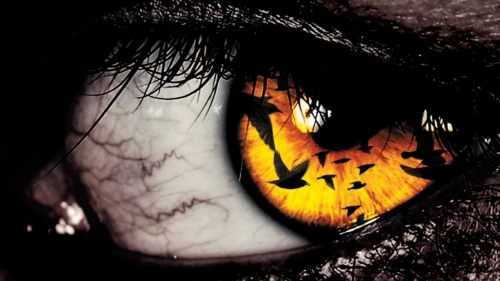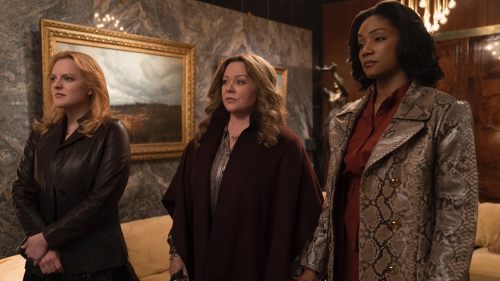QUEEN OF EARTH Is An Unsettling Study Of Self-Importance
Alex Ross Perry's Queen of Earth is apt to draw comparisons to nerve-rattling psychological dramas of the '70s, with names like Polanski and Cassavetes casually tossed around as references. Elisabeth Moss' performance is easily on par with Catherine Deneuve and Gena Rowlands, a woman under the influence of life's cruel banalities, sliding deeper into her own repulsion and repulsive tendencies.
The film opens with what might very well be the single best break-up scene in recent memory, a breathtakingly honest adaptation of a life experience we sadly know all too well - you've been on one or both sides of this conversation, but Perry frames the camera such that we're on the delivering end of heartbreak, framing Moss' gloriously tear-soaked and desperate eyes with the empathy her boyfriend lacks. From there, Moss' Catherine heads to a secluded lake house with her best friend Virginia (Katherine Waterston) for a relaxing summer retreat - a vacation that's equal parts distraction and rehabilitation.
As Catherine struggles to cope with the heartbreak of her father's recent suicide and the subsequent loss of her boyfriend, the narrative slips between summers past and present with surreal fluidity, echoing Catherine's increasingly weak grasp on dull concepts such as time and memory. It's not just the jarring score or the way Perry's camera lingers distrustfully on both Catherine and Virginia that make Queen of the Earth so evocative of its predecessors - Perry's film is more than the basic components of psychological drama. It is a riveting study of the ways in which the idiosyncrasies of body language - the tilt of a head, a generous laugh, a rigid stare - and the delivery of a line can drastically alter the banality of language.
Much of the film's dialogue is - like much of our every day exchanges - plain. Stories of break-ups and first loves, of careers and passions are far more interesting to the speaker than to the listener(s), but Moss and Waterston's deliveries on both the giving and receiving ends of these conversations highlight how the subtleties of performance can completely transform the tedium of language - the slightest step in another performative direction could easily make Queen of Earth a comedy or a wistful drama.
Beyond its mechanical components, it is a layered exploration of our singular relationships and the leisurely self-importance of our existence. People exist in egotistical spheres, our entire lives surrounded by what we like and what we do. Our relationships with others create venn diagrams where these circles of us overlap with circles of them, creating a space of shared commonality and providing the opportunity for co-dependency. As such, the title Queen of Earth has an effective implication, one that speaks to our belief - asserted or hidden - that we are each both the ruler and the most important subject of our individual microcosms.
Catherine shifts between past and present, the earlier informing the latter as her subjective interpretation of the past informs the evaporating objectivity of the present. The shifts in narrative are not fluid and dreamlike, and though they are seamless they are abrupt and thus feel increasingly like waking nightmares. Through these narrative slips we learn that Virginia dealt with her own heartache the summer before, and instead of getting a restorative weekend alone with her friend, Catherine brought her boyfriend along.
Much of Queen of Earth is about perception - not only how we perceive the tone of a narrative by its mechanical components, but about the ways we perceive our relationships with others and ourselves. What is a good friend? Catherine and Virginia bicker and hold grudges and judge one another shamelessly, and there is a competitive self-righteousness underscoring their relationship. This willingness to overcome such basic pettiness is what sets a platonic, enduring friendship apart from a fickle romantic one.
Perhaps more unnerving than Catherine's continued unraveling is the scene at the heart of the film, terrifying in its effortless honesty. We watch as Catherine and Virginia exchange stories of significant relationships, each patiently waiting for the other to finish speaking, each offering a pacifying laugh or nod as the other gives a well-rehearsed monologue about a break-up that deeply affected them. The lines sound well-rehearsed not because Moss and Waterston are so obviously performing, but because these are the truths they have practiced believing by repeating these stories to themselves and other people over and over and over again. We get the sense that Catherine has heard Virginia's story more than once and vice versa, but each graciously allows the other to speak at length - they are not listening, but merely waiting for their turn to speak.
And this is the precise horror that lies at the center of Queen of Earth - not the self-importance of depression and the terrifying ease with which a person can make us feel as though we no longer exist just by breaking our heart; not the inarticulate actuality of an all-consuming heartache, a pain that becomes comforting because it keeps us from letting go of the sadness, which is all we have left; not the slippery slope of depression that begins to feel like madness, where we've gone so far into ourselves that we no longer want to understand anything or anyone else, where we become the queen (or king) of our own individual earth.
No, the horror of Queen of Earth is in the monotony of our selfishness in every relationship. It's in the idea that our conversations and relationships are entirely one-sided, that we are all just waiting for our turn to speak, that we can conduct entire exchanges of dialogue with others that sound like two halves of entirely different conversations - because when something bad happens to us, it might as well be the end of our world, and our instincts are both self-preserving and self-serving.
It is too easy to become the queen of earth - the key to avoidance is empathy, which eerily haunts the periphery of Perry's film like a rejected ghost.



